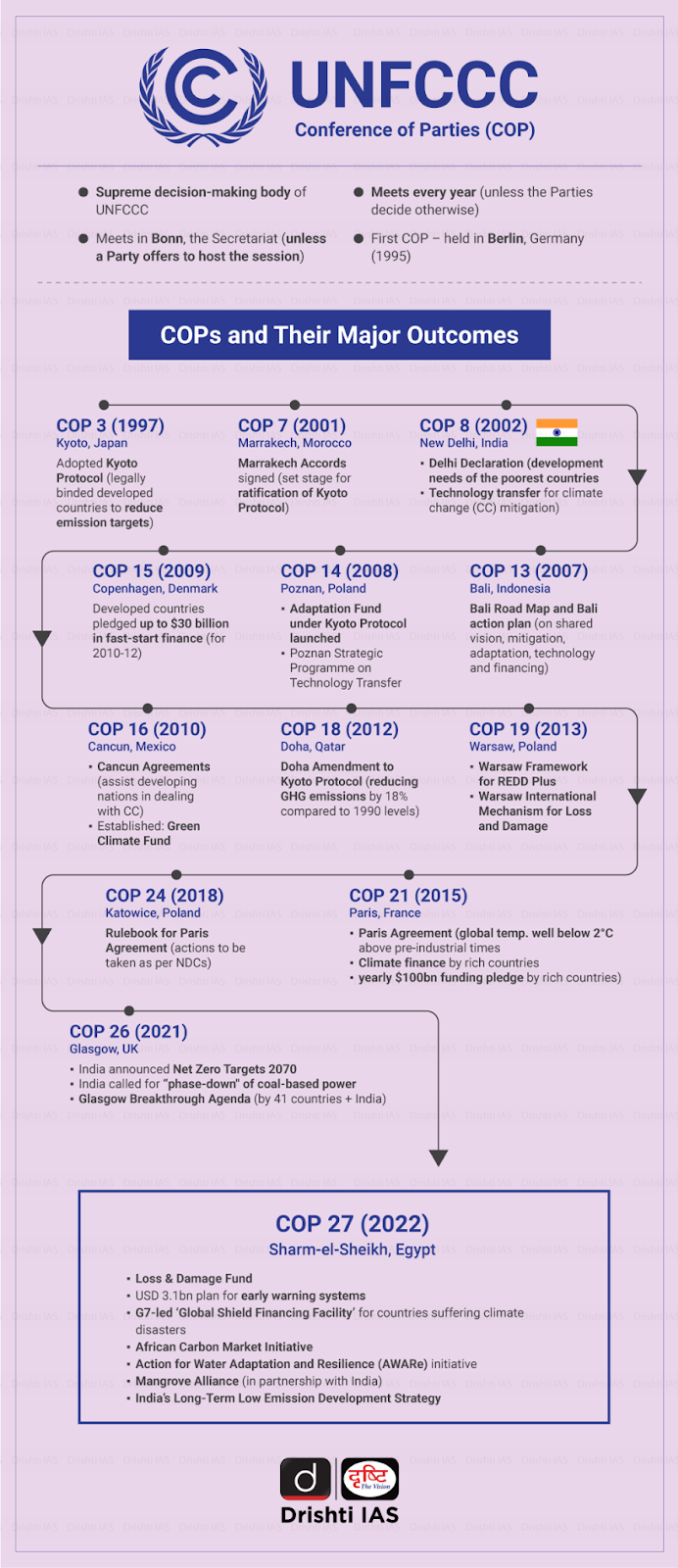Biodiversity & Environment
Bonn Climate Meet
- 21 Jun 2023
- 5 min read
For Prelims: Bonn Climate Meet, Paris Agreement, COP 28, UNFCCC, Climate Change, Global Stocktake.
For Mains: Bonn Climate Meet.
Why in News?
Recently, Delegates to the Paris Agreement met in Bonn, Germany, paving the way to some key decisions for the UN Climate Conference (COP 28) in Dubai in 2023.
- The Bonn session concluded with the agreement to share "informal notes" that will guide continued work leading up to COP (Conference of Parties) 28 in Dubai.
What are the Key Highlights of the Meet?
- Global Stocktake:
- Technical discussions were held on the Global Stocktake (GST), producing a short Framework on the elements to be included in the stocktake exercise.
- GST is a process mandated by the 2015 Paris Agreement, which is an exercise to assess progress in combating Climate Change and determines ways to strengthen global efforts to address the gap in adequacy.
- According to the Paris Agreement, the GST should take place every five years, starting in 2023. The actual meeting on GST would come in at COP28.
- Advancing Post-2030 Ambition:
- Parties and civil society representatives used the meeting to focus on post-2030 ambition, particularly through advancing the work on the Global Stocktake.
- It seeks to strengthen efforts in adapting to climate change impacts and mobilizing financial and technical resources for developing nations.
- Funding Arrangements for Loss and Damage:
- Discussions focused on implementing balanced funding arrangements to address Loss and Damage (L&D) caused by climate change, particularly for vulnerable communities.
- While progress was made in operationalizing the Santiago Network on loss and damage, the issue of the network's host remained unresolved.
- The Santiago Network aims to catalyze the technical assistance of relevant organizations, bodies, networks and experts, for the implementation of relevant approaches for averting, minimizing and addressing L&D at the local, national and regional level, in developing countries that are particularly vulnerable to the adverse effects of climate change.
- Climate Finance Alignment:
- The EU emphasizes the need to align global financial flows with the goals of the Paris Agreement.
- This includes examining the pool of donors and ensuring that the scale of financial support matches the requirements to address the climate crisis.
- The EU and many other countries emphasize the importance of addressing climate finance at COP28.
- Post-2025 Climate Finance Goal and Funding Arrangements:
- Constructive and substantive discussions took place in the technical expert dialogues regarding the new post-2025 climate finance goal and funding arrangements, including a fund for loss and damage.
- Urgency of Adaptation:
- Developed countries, including the EU, acknowledge the urgency of addressing adaptation needs.
- They commit to scaling up support by strengthening existing arrangements and institutions with proven experience and expertise in assisting vulnerable communities.
The Conference of the Parties (COP)?
- COP is the apex decision-making authority of UNFCCC (United Nations Framework Convention on Climate Change).
- The COP meets every year, unless the Parties decide otherwise. The first COP meeting was held in Berlin, Germany in March 1995.
- The office of the COP President normally rotates among the five United Nations regional groups which are - Africa, Asia, Latin America and the Caribbean, Central and Eastern Europe and Western Europe and Others.
- The President is usually the environment minister of his or her home country. S/he is elected by acclamation immediately after the opening of a COP session.






